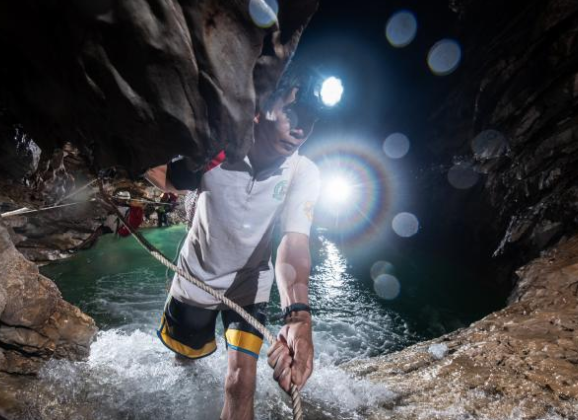An hour later we arrived at the mouth of Good Luck Cave, where a river emerged from a tall cleft in a wall of limestone. We waded in and pushed ahead, the clear warm water reaching first to our calves, then swelling over our hips, then shoving into our chests.
一小时后,我们到达了幸运洞洞口,在那里,一条小河从石灰岩壁高处的裂缝中涌出。我们涉水前行,清澈温暖的水流先没过小腿,然后涨到臀部,又没过胸膛。
The passage widened and grew, opening like a train tunnel above us. Bats and birds commuted through it, occasionally dipping into our headlamp beams, and soon the river became whitewater, blasting through sharp channels of limestone, forcing us onto boulders slick with spray and guano.
通道变得宽阔起来,像火车隧道一般在我们头顶铺开。蝙蝠和鸟儿穿梭其间,时不时地穿过照明灯的光束。没过一会儿,小河就变得湍急,冲进石灰岩的缝隙。我们不得不爬上光滑的大卵石。被浪花冲刷的大卵石沾满了鸟粪。
The route was so treacherous that in certain places previous cavers had bolted ropes to the walls so they could drag themselves forward against the current.
这条路线很危险。先前的探险者需要在几处地方把绳索固定在岩壁上,让绳子拽着他们前行,冲过湍流。

After a wild and sodden mile, the river disappeared into the earth, and Sarawak Chamber swallowed us into its vastness.
过了这惊险的一英里,队员们浑身都湿透了。小河流入了土壤,我们被无比宽阔的砂拉越洞穴吞没了。
Even when every lamp focused upward, we could see only the dim suggestion of its massive dome. And if we turned our lamps toward the back of the cave, we saw nothing at all. It was easy to imagine Eavis and his friends lost, years before, in the void.
就算每盏照明灯都照向上方,我们也只能模糊地看见大穹顶。而如果我们把照明灯照向洞穴后方,就什么都看不见了。不难想象艾维斯和他的朋友们几年前迷失在这黑暗空间的情景。
"If you look around, you might find our old boot prints," Eavis said, laughing. "Stumbling around like blind mice we were."
“环顾四周,你可能会看到我们以前的脚印。”艾维斯笑着说。“你们跌跌撞撞的样子和我们当初一样,像一群瞎眼鼠。”












